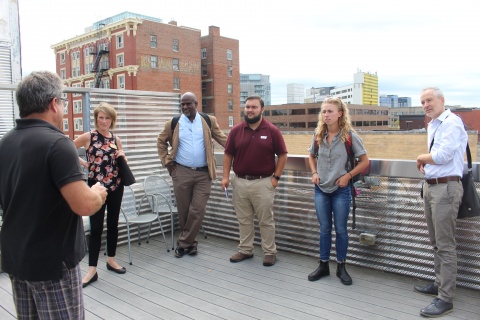Iowa City Downtown Historic Preservation Initiative
As part of their capstone project, second-year graduate students from the School of Urban & Regional Planning assessed current community interests, planning tools, and environmental needs to develop strategies for aligning preservation of Iowa City's unique historic downtown architecture with other community values.
Iowa City has an active downtown with rich historic character and a diversity of building types, new and old. A number of buildings in the downtown are listed in the National Register of Historic Places (NRHP). While a NRHP listing offers minimal protection to these structures, it does incentivize historic rehabilitation and conservation to retain the historic integrity of the community. Locally, cities have the authority to protect historic buildings and areas through the creation of local historic landmarks and districts, which are typically regulated by adopted historic preservation guidelines. Local historic districts give local governments greater power to protect historic buildings, neighborhoods, and downtowns.
While local historic protection is based on the framework of national and state standards, these should be established in a way that protects the long-term viability of downtowns and neighborhoods and is supportive of other community goals. The Standards are intentionally vague and do not directly address accessibility, property values, and other social values.
This report enriches understanding of historic preservation, especially as it is applied to Iowa City’s downtown, and how that practice addresses, or fails to address, the shared values and needs of the community. This report establishes and delivers recommendations on how local preservation policies can be made to better address local needs—not just preservation needs, but also other needs, such as: environmental needs, including those pertaining to sustainability and climate change; accessibility, particularly for the disabled; community development and improvement; and affordable housing. These are key areas of broad concern identified by National Main Street Director Patrice Frey as related to but not usually underscored by historic preservation and its advocates. She argues in a February 8, 2019 article in CityLab that preservation’s stock can be better supported by extending the conversation about preservation to include preservationists and those who primarily think about and advocate in each of these related areas.
The planning team's recommendations are based on studying and summarizing the underlying principles of historic preservation, reviewing state and federal guidelines, and conducting stakeholder interviews with community leaders, policy makers, building owners, and business owners and then drawing conclusions based on the objective of exploring the value of historic preservation in downtown Iowa City beyond the protection of older buildings In particular, they recommend that careful thought be given to how downtown Iowa City represents not only the extant historic buildings in downtown Iowa City, but as the city center it represents the history of the various peoples who have lived or live now in Iowa City, even before Iowa City was incorporated under that name.
